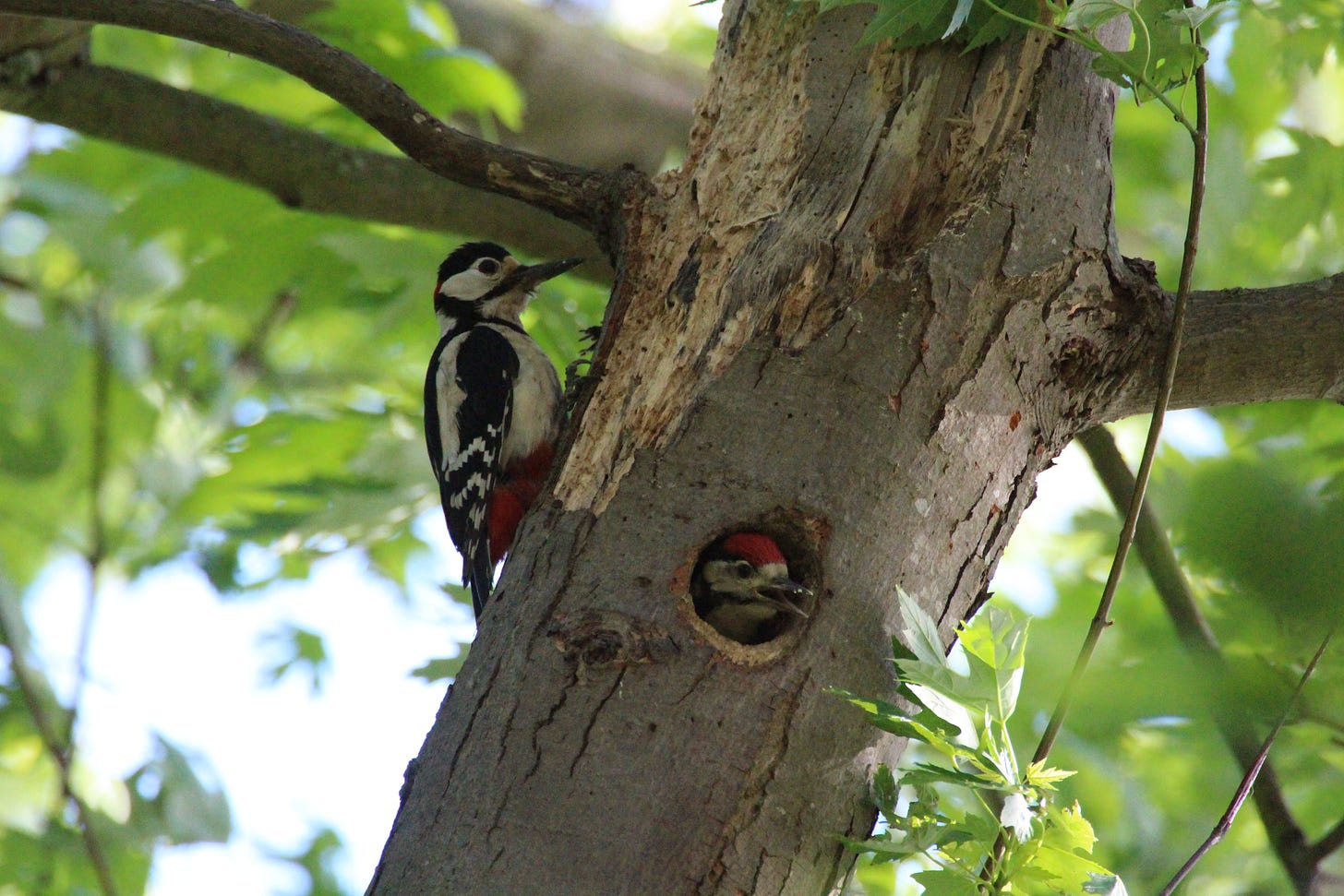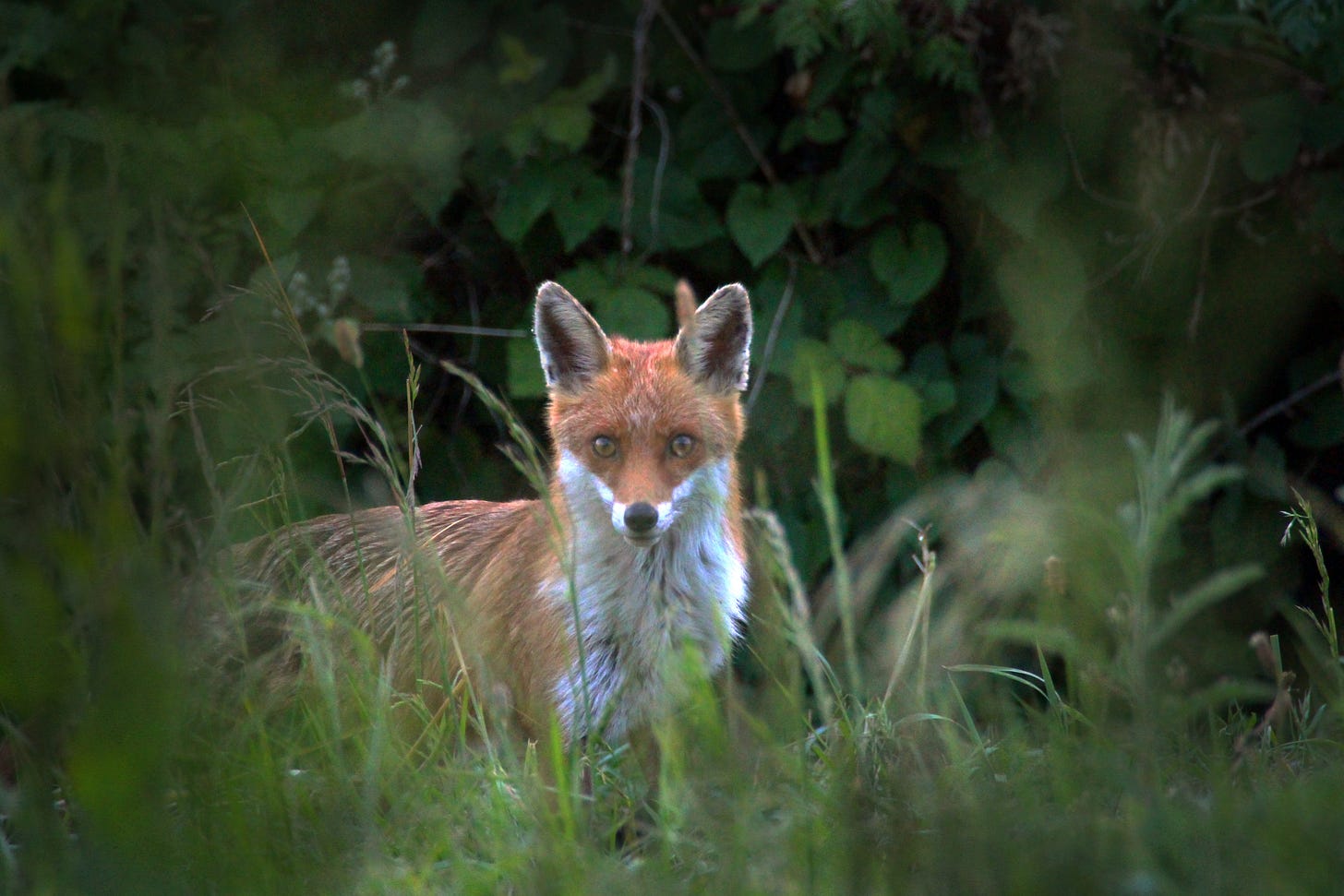One day in late spring.
Woodpeckers, foxes, cuckoos.
It’s been fairly glorious out there the last couple of days. The dawn has arrived awash with birdsong and sparkling dew. The comfrey is smothered with bumblebees, and local feathered celebrities have been causing a stir.
It hasn’t been without its challenges. Two days of torrential rain raised the level of the canal and sunk the nearby swans’ nest - and its eggs with it. That’s the second clutch to be swept away this year, a direct result of man-made rising temperatures bringing with them uneven rainfall patterns. I feel for them, but nearby swans nesting in a more sheltered place are doing well. And there’s still a gaggle of around sixteen goslings trotting after their aunts and uncles every day. Nature knows not to put all its eggs in one basket. It spreads things out, hedges its bets to cover inevitable losses.
The photographers in the wetlands have been lining up to get their shots of a family of great spotted woodpeckers. Just off the path, I couldn’t resist joining in once I learned where the nest was.
The fledgling was calling persistently for food. The parents diligently provided, tirelessly offering berries and insects.
Further up the path, the rain and the sun have encouraged the grass to shoot sky-high. Thick with wildflowers all the way to a dense mixed hedge, I would have walked straight past it if my partner hadn’t spotted some movement.
A rustle. An orange blur. A sharp eye.
Three fox cubs, playing in the grass, tumbling around like feisty siblings hyped up on sugar.
The vixen was out hunting somewhere. A couple of days later I would see her patrolling the water’s edge for fish or young waterbirds and ducking dive-bombing crows, but this time she was nowhere to be seen.
We watched the cubs for a while. They rolled around in the long grass, nipping and playing, before spotting us.
The snap of my camera’s shutter was enough to send them scurrying back into the safety of the hedge, and the vixen returned to keep a close eye on us.
I still find it incomprehensible that humans managed to turn hunting these creatures into a sport. Watching these cubs lounging in the sunshine, playing hide and seek with each other and discovering the world the first time brought nothing but joy. To see these majestic animals as anything other than caring and loving will always be a mystery to me.
This morning, the first thing I heard when I stepped outside just shy of 7 a.m. was the sound of summer.
Cu-ckoo. Cu-ckoo. Cu-ckoo.
I followed the call into the wetlands, camera in hand. Volunteer bird ringers reported seeing it flying between the reedbeds and the trees, and the chase began. Each time I came close to the tree it was calling from I would pause, wait, then hear it calling from somewhere totally different.
Cuckoos are brood parasites. They sneak into other birds’ nests when the parents aren’t looking, push an egg out, and lay their own. When the young cuckoo hatches, it quickly disposes of all the other eggs and makes the most of being fed by the duped bird.
As I followed it around the wetlands, I spotted a globule of cuckoo spit hanging from the stem of a plant. Known to occur around the same time of the year as cuckoos arrive in Britain, the discharge has nothing to do with the birds but is actually left by froghopper nymphs feeding on the sap of the plant.
As I examined it, the cuckoo called above me. Close.
I saw movement in the tree. I lifted my camera…
…and realised I had left the memory card on my desk at home.
The cuckoo carried on its circuit of the wetlands, and I carried on with the dead weight of my useless camera hanging off my shoulder.
But in many respects, it was a relief not to have a functioning camera with me. It meant I no longer felt the pressure to take a decent photo of anything I saw. I could just look at it, sit with it, enjoy it. I could be present. I might find the cuckoo close by and have no way of ever proving to anyone that I saw it, that I was there, look, here’s the evidence - validate me. Instead it would be a private moment, a hidden one, fleeting and all the more special for it.
I stood listening to the call for a while. As the sun climbed higher and shone golden on the water, I turned my attention back to home, and to breakfast.
It won’t be long until the cuckoo heads south. The more I learn about birds, the more I realise that my ears are much more important than my eyes. The cuckoo, with its legendary two-tone call, has led me somewhere.
I don’t have the photos to show it, and it doesn’t bother me one bit.









“But in many respects, it was a relief…” 🤣 I am in the habit of taking photos, and sometimes my kids will say, “Oh no, you don’t have the camera!” and I’ll say, “I guess I’ll just have to enjoy it with my eyes!” It’s a balance 🤣
How beautiful to spot the foxes, Thomas! I spotted a family of wild boars while I was driving in the countryside some evenings ago, they were crossing the street and looked like a school trip with the adults waiting at each side of the road while the little ones were crossing. I understand the sense of relief when you figured out you couldn't immortalize the cuckoo with your camera, it happened to me as well regarding my journal. Sometimes I feel the pressure of documenting everything while even just observing and enjoying the moment would be quite enough.